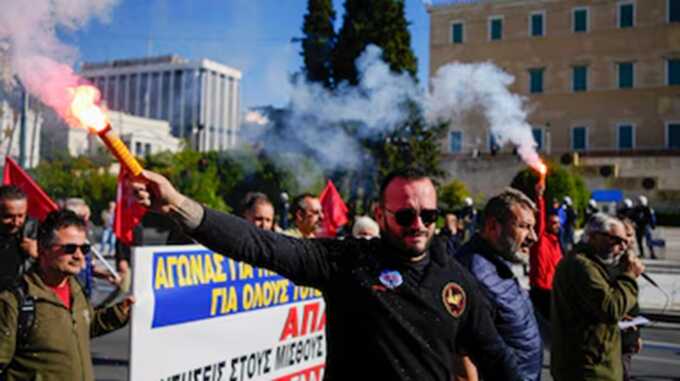Greece hit by general strike as workers protest against cost-of-living squeeze

Unions demand ‘dignified wages’ as unequal recovery from debt crisis has left many struggling with higher costs
A nationwide strike by public- and private-sector employees looks likely to paralyse Greece on Wednesday as the pro-business government of the prime minister, Kyriakos Mitsotakis, comes under increased pressure to deal with a worsening cost of living crisis.
Unions demanding “dignified wages” in the face of soaring consumer costs and widening wealth inequality vowed that the 24-hour strike would bring the country to a standstill, with protest rallies planned in cities countrywide.
Government offices, schools, hospitals and public transport, including train services and island ferries, are expected to be affected by industrial action, which began with employees at state- and private-run media outlets on Tuesday.
Union leaders have accused the centre-right administration of failing to address escalating inflation and argue that the rising cost of living has corroded living standards to the point where many are finding it hard to survive.
“The cost of living is sky high and our salaries rock-bottom, while high housing costs have left young people in a tragic position,” said Yannis Panagopoulos, who heads the main private sector union, GSEE.
Like other labour groups, GSEE accused the government of “refusing to take any meaningful measures that would secure workers dignified living conditions”.
Low-income Greeks are forced to get by on a minimum wage of less than €900 (£750) a month in a country where retail, telecommunications and energy prices are some of the highest in Europe.
The leftwing opposition has frequently claimed the less privileged are compelled to pay “British prices on Bulgarian salaries”.
Mitsotakis recently pledged to increase the minimum wage to €950, but with housing costs also on the rise he has faced criticism that it is simply not enough in a society where the gap between rich and poor has grown in recent years.
The general strike comes in stark contrast to the economic progress Greece has made since exiting a debt crisis that almost saw it fall out of the eurozone a decade ago.
In praise that would have seemed unimaginable at the height of the crisis, credit ratings agencies have applauded the Mitsotakis government for fiscal reforms that have not only seen targets met and the country return to investment-grade status, but resulted in Greece outpacing other EU member states in terms of economic growth.
The nation has posted one of the highest growth rates in Europe, with the EU predicting the Greek economy to grow by 2.1% in 2024, slightly below the 2.3% forecast by the IMF but many times higher than the weak overall 0.8% growth predicted by the Washington-based organisation for the eurozone as a whole.
Unemployment has similarly fallen from a high of nearly 30% to 8.3%, the lowest in 20 years. The recovery has been accelerated by record tourism, which accounts for more than 20% of GDP and one in five jobs.
Evidence of the remarkable turnaround was highlighted on Monday when Mitsotakis announced that in 2025 Greece will make an early repayment of €5bn of bailout-era loans given by the EU and IMF to keep the nation afloat.
Describing the repayment as a sign of the country’s fiscal recovery, he told a business conference in Athens that the move “underscores our confidence in public finances and reflects our commitment to fiscal discipline”.
Although Greece remains saddled with one of the highest debt-to-GDP rates on the continent, the finance ministry says that proceeds gained through successfully combatting tax evasion will also help reduce the burden.
But the economic rebound remains a world away from the reality of Greeks left reeling from the austerity-driven budget cuts and tax hikes the nation was forced to endure to escape bankruptcy during the crisis.
“It’s a success story that cannot be translated into real-life gains for ordinary people on the street,” said Yannis Koutsomitsis, a political analyst. “There’s a lot of anxiety out there precisely because so many are finding it hard to make ends meet. Again and again you see it reflected in polls along with the general feeling that this is a government that has failed to grasp the severity of the situation.”
Read more similar news:
Comments:
comments powered by Disqus

































